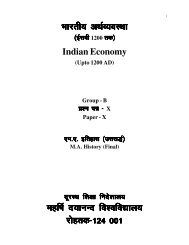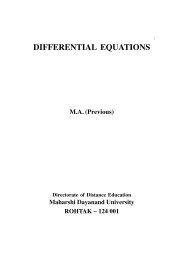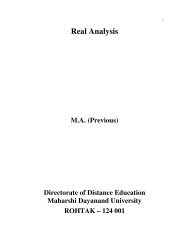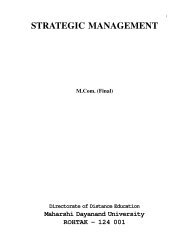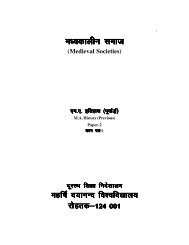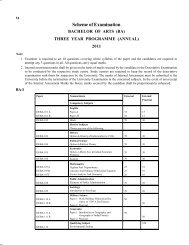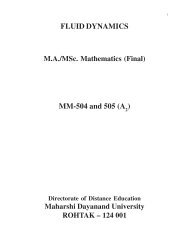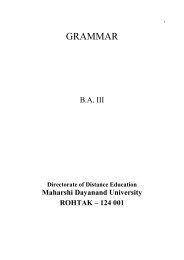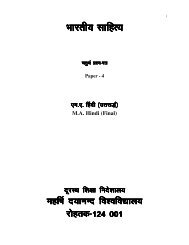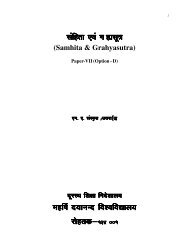50Literature and GenderHow invigorating this legacy of traditional theatre has proved for Indian theatre can be illustrated by two other plays,which appeared soon after Hoyavadana. In his Ghasiram Kotwal, Tendulkar uses Dashavatara, a traditional semiclassical form, to investigate a contemporary political problem, the emergence of ‘demons’ in public. These demonsare initially created by political leaders for the purposes of their own power games, but ultimately go out of control andthreaten to destroy-their own creators. It is a theme recurrent in Indian mythology: the demon made indestructible bythe boon of gods and then turning on the gods themselves. (A decade after the play was written, in Punjab, SantBhindranwale and Mrs. Indira Gandhi seemed to be re-enacting the theme in real life in horrifying detail.)The central theatrical devil in the play is the use of about a dozen singers who start conventionally enough as a chorus.But as the play progresses, they become the human curtain alternately hiding the action and revealing bits of it as ina peep show. From neutral commentators, they slide into the roles of voyeurs who enjoy the degeneration theycondemn, of courtiers who perpetrate atrocities, and of the populace that suffers the harassment. In the final scenethe demon is ritually destroyed, torn limb from limb; the city is exorcised, and the now-purified stage is filled withrevellers led by the politician who initially created the demon.In Jabbar Patel’s production, music and dance become the instruments of comment and analysis. Ritualistic movementsturn imperceptibly into an orgy or a political procession, the music by Bhaskar Chandavarkar, based on traditionaldevotional tunes, continually turns upon itself, sometimes indulgently, sometimes critically. Unexpected breaks janglethe nerves of the audience. There is no explicit political analysis, but the matrix of the myth and the ironic use ofDashavulara drive the point home.Unlike most Indian playwrights writing today, Chandrasekhar Kambar does not come from an urban background. Ashe was born and brought up in the country, there is no self-consciousness in his use of Bayalata, a secular folk formof his region. He draws upon the rich resources of popular speech and folklore with an effortlessness that concealsa rare sophistication of sensibility and technique. He is a poet at ease with the ballad, and his approach to poetry onstage is through the ballad rather than the lyric; the imagery is the action, the metaphors serve to resonate thenarrative at different levels of meaning.Joku1naraswamy starts with a fertility rite in honor of the phallic deity Jokumara, who is worshipped in the form ofa snake gourd and then consumed by those desirous of bearing children. The basic situations as well as the music areall traditional, in the sense that they are set pieces, familiar in Bayalata drama. The impotent chieftain’s virgin wife feedsthe snake gourd by mistake to the village rake and has a child by him. The rake’s death at the hands of the chieftain’smen is a kind of gang rape-cum-fertility offering. The chieftain himself is literally left holding a baby he cannot disown.Through this semicomic tale, Kambar makes a very Brechtian statement about the right of the peasants to the land onwhich they work virtually as series for an absentee landlord. But the analysis goes beyond this rather obvious politicalmanifesto to a complex exploration in action of political power as a compensation for sexual inadequacy, of philanderingas a psychosexual equivalent of anarchism, which can be controlled by love and responsibility. By working out thepsychological, social, and political implications of the concept of virility, the play brings out the ambiguous nature of thevery fertility rite it had set out to celebrate.It must be admitted that the popularity of traditional forms on the urban stage has much to do with the technicalfreedom they offer the director. Music, mitre, and exotic imagery open up vast opportunities for colorful improvisation,which nevertheless can-and alas! all too often does--degenerate into self-indulgence. While there are productionstoday which combine traditional theatre techniques with modern choreography and visual design to an effectunimaginable in tile ’60s, most such efforts tend to be imitative and soul-less. It is as though now that the problem hasfound a technical solution, the spirit of the quest has been lost.Naga-Mandala is based on two oral tales I heard from A. Ramanujan. These tales are narrated by women-normallythe older women in the family-while children are being fed in the evenings in the kitchen or being put to bed. The otheradults present on these occasions are also women. Therefore these tales, though directed at the children, often serveas a parallel system of communication among the women in the family.They also, express a distinctly woman’s understanding of the reality around her, a lived counterpoint to the patriarchal
Girish Karnad – Nagamandalstructures of classical texts and institutions. The position of Rani in the story of Naga-Mandala, for instance, can beseen as a metaphor for the situation of a young girl in the bosom of a joint family where she sees her husband only intwo unconnected roles-as a stranger during the day and as lover at night, inevitably, the pattern of relationships she isforced to weave from these disjointed encounters must be some thing of a fiction. The empty house Rani is locked incould be the family she is married into.Many of these tales also talk about the nature of tales. The story of the flames comments on the paradoxical natureof oral tales in general: they have an existence of their own, independent of the teller and yet live only when they arepassed on from the possessor of the tale to the listener. Seen thus, the status of a tale becomes akin to that of adaughter, for traditionally a daughter too is not meant to be kept at home too long but has to be passed on. This identityadds poignant and ironic undertones to the relationship of the teller to the tales.It needs to be stressed here that these tales are not leftovers from the past. In the words of Ramanujan, ‘Even in alarge modern city like Madras Bombay or Calcutta, even in western-style nuclear families with their well-planned 2.2children, folklore . . is only a suburb away, a cousin or a grandmother away.”The basic concern of the Indian theatre in the post-independence period has been to try to define its ‘Indianness.’ Thedistressing fact is that most of these experiments have been carried out by enthusiastic amateurs or part-timers, whohave been unable to devote themselves entirely to theatre. I see myself as a playwright but make a living in film andtelevision. There is a high elasticity of substitution between the different performing media in India: the participants aswell as the audiences-get tossed about.The question therefore of what lies in store for the Indian theatre should be rephrased to include other media aswell-radio, cinema, audiocassettes, television and video. Their futures are inextricably intertwined and in this shiftinglandscape, the next electronic gadget could easily turn a mass medium into a traditional art form.Perhaps quite unrealistically, I dream of the day when a similar ripple will reestablish theatre-flesh-and-blood actorsenacting a well-written text to a gathering of people who have come to witness the performance-where it belongs, atthe centre of the daily life of the people,Note to the Play Naga MandalaSummaryIn the note to the play that the author wrote on 28 November 1988 he has acknowledged his debt to Professor A.K.Ramanujan for the source, the play, the two oral-tales from Karnataka as told by the Professor. Incidentally Karnadalso dedicated the play to Professor Ramanujan.PrologueThe play begins with a prologue. The setting of the play in the inner sanctum of the rural temple sets the tone of theplay. The ruined temple, the broken idol, the moonlight filtering through the cracks in the roof combine to suggest thatthe play shall unfold something more ethereal than merely material.A man sitting all alone in the desolate precincts is trying hard to keep himself awake. He opens his eyes wide, turnshis eyelids upside down and shakes his head violently to keep himself from falling asleep. He addresses the audienceto tell them the cause of his desperate need to remain awake.He had been told, says he, by one mendicant to keep awake for at least one night of the month failing which he woulddie. He had tried hard to keep awake for the whole night one after the other but failed. It is not so easy to evade sleep;one falls asleep involuntarily in spite of the best efforts to hold oneself together, sleep comes stealthily and conquersyou. The man’s speech is interspersed with pauses.The age-old analogy between death and sleep is deeper in this case, since sleep on this particular night can bring theMan’s death. He even warns the audience that he may fall dead in front of them if he fails to keep awake. The manhas realized the power of sleep over man’s body.“ I thought nothing would be easier than spending a night awake—— I was wrong— Perhaps death51



